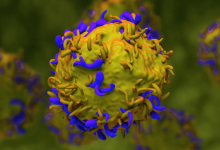Canakinumab Yields Genetic and Disease Modifying Effects in TRAPS Patients Save

Tumor necrosis factor (TNF) receptor-associated periodic syndrome (TRAPS) is an autosomal-dominant autoinflammatory disease resulting from mutations of the TNF super family receptor 1A (TNFRSF1A) gene.
It is believed that misfolding of the TNFR1 protein product triggers stress-related responses and accompanying inflammatory reactions resulting in enhanced IL-1β release. Because of increased activity in the IL-1 pathway, it has been hypothesized to be a viable therapeutic target in TRAPS. Canakinumab was investigated in TRAPS, as it is a high-affinity human monoclonal antihuman IL-1β antibody designed to bind to human IL-1β and block the interaction of the cytokine with its receptor.
In a phase II proof-of-concept study, canakinumab treatment provided complete or near-complete clinical responses in 19 of 20 patients with active recurrent or chronic TRAPS (ClinicalTrials.gov identifier number NCT01242813).
Following the study, investigagors performed an analysis of gene expression from patients in this study and age-matched healthy volunteers to characterize treatment-induced alterations.
The TNFRSF1A gene was shown to be known to unregulated in patients with TRAPS. Subsequently its levels decreased 1.4-fold with canakinumab treatment. In addition, other pro-inflammatory genes, such as MAPK14, NFKB1, TLR5 and MMP9, were suppressed by canakinumab. Changes in expression of these genes were largely maintained with continued canakinumab treatment through day 113.
The study concluded that IL-1β inhibition by canakinumab downregulates genes in the IL-1 signalling and other innate immunity pathways and downregulates both the disease-causing and drug-targeted genes that drive the inflammatory responses. The decrease in pro-inflammatory signaling and the reduction in neutrophil counts most likely contribute to the clinical improvement seen in these patients, suggesting that canakinumab produces disease-modifying effects in TRAPS.










If you are a health practitioner, you may Login/Register to comment.
Due to the nature of these comment forums, only health practitioners are allowed to comment at this time.